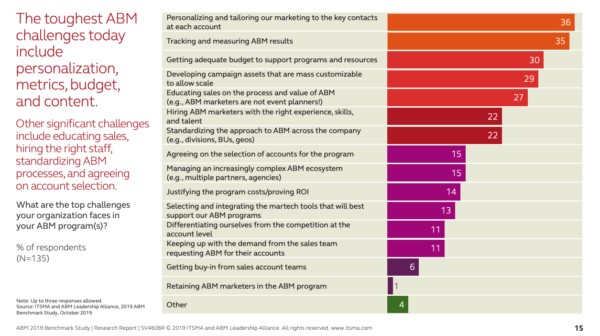
B2B Articles - December 21, 2020
Account-based marketing (ABM) is an increasingly popular strategy in the B2B industry. Known for closing more qualified leads, ABM yields a higher ROI; 71% of ABM marketers cited a higher return compared to traditional marketing initiatives. ABM budgets have increased 21% in the last year, according to ITSMA, making this a much-watched strategy for any B2B company.
Account-based marketing comes with its challenges. LinkedIn's study found that B2B marketers struggle to find reliable data, create personalized content at scale, prove effectiveness on the sales pipeline, and develop content for the buyer group.

ITSMA's findings illustrate similar challenges, with 36% of respondents citing personalizing marketing as an obstacle, followed by tracking ABM results (35%), developing campaign assets at scale (29%), and educating sales on the process and value of ABM (27%).

Tackling these challenges takes time. Transitioning to account-based marketing is not a quick process and requires patients from teams. Two of the biggest challenges are getting the sales team on board with this new way of work and fostering a collaborative environment between the sales and marketing teams. Once teams understand ABM's value, they can work together to create personalized content at scale and test different marketing tactics.
The challenge of educating the sales team on ABM and proving ABM's impact on the pipeline can be achieved by getting the sales team on board. This, of course, is no easy task, but effective multichannel ABM strategies require sales participation, making it the first step to developing a successful ABM strategy internally. Companies should address the sales team's concerns about the shift and offer numbers that show ABM's worth. Switching to targeting certain accounts may make the sales team feel like they are ignoring other qualified leads, so sales teams have to change their perception of how sales will work and get rid of the idea of working in a silo.
Connecting sales and marketing teams earns better results. Many companies struggle with this, as ITSMA found that only 16% of ABM teams are satisfied with the degree of the ongoing collaboration between sales and marketing. The most effective ABM programs have a strong integration of the two groups, making this a necessary strategy. Sales and marketing alignment does not happen overnight, but teams can automate this process through tools such as HubSpot and by creating a collaborative environment. Again, like ABM itself, sales and marketing alignment takes patients and a high level of communication.
These two teams working together solves the challenge of account-based marketers not having access to useful data. When the sales team works in a silo, marketers are left wondering how effective their campaigns are, as they do not have access to this data. Putting these two teams together allows for better data gathering and analysis across the company.
Content marketing in ABM takes a different approach. Account-based marketers start by segmenting along the sales funnel. The top-, middle-, and bottom-of-the-funnel prospects are all at different points in the buyer's journey, so they will need different types of content. ABM content doesn't stop there; instead, it segments those lists again by industry, account, type of lead, or topic. A personalized piece of content could be, for example, a short eBook discussing the pain points for IoT marketers (this targets the top-of-the-funnel and a specific industry).
Taking on this challenge can begin with auditing the current content. Most marketers have a robust library of written resources that can be categorized and used for a particular segment. While categorizing content takes time, personalized content is a driving force behind ABM's success.
Becoming ABM-driven takes time and numerous tests. Teams cannot expect to hit it out of the park right away. Instead, companies should learn how to iterate and test an account-based marketing campaign. Different testing methods, including audience, platform, messaging, creating, and budget, are crucial to success. Since ABM focuses on a multichannel experience, the testing and optimization process takes time.
It is possible to tackle challenges with account-based marketing, but teams should remember that transitioning to this strategy takes time and patience. Sales teams may find themselves frustrated that they are not closing as many deals right away, and marketers may struggle to understand how to create content in this context. The more businesses analyze data, test, and revise campaigns, the closer they will come to account-based marketing.
Sources
ITSMA, Moving to ABM Maturity: 2019 ABM Benchmark Study, December 2019.
LinkedIn, Introducing the B2B Jumpstart to Account-Based Marketing Guide, October 17, 2019.
Tel 212-993-7809
Ironpaper ®
10 East 33rd Street
6th Floor
New York, NY 10016
Map
First-party data marketing
SEO for B2B
Customer journey strategy
ABM Agency
Marketing for IoT Companies
HubSpot Implementation
B2B Product Marketing
Measurable Marketing
IoT go-to-market strategy
IT Marketing
HubSpot for ABM
Go to market strategy
Technology Marketing
Marketing for IT Companies
ABM Campaigns
B2B lead generation
B2B Marketing and Growth Agency.
Grow your B2B business boldly. Ironpaper is a B2B marketing agency. We build growth engines for marketing and sales success. We power demand generation campaigns, ABM programs, create B2B content, strengthen sales enablement, generate qualified leads, and improve B2B marketing efforts.